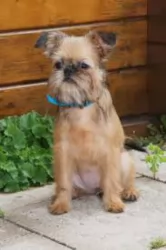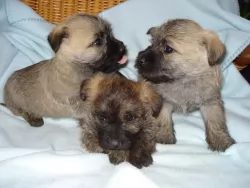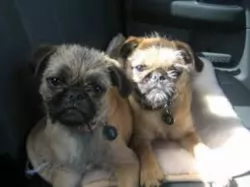 MyDogBreeds
MyDogBreeds Nova Scotia Duck-Tolling Retriever is originated from Canada but Brug is originated from United States. Nova Scotia Duck-Tolling Retriever may grow 8 cm / 4 inches higher than Brug. Nova Scotia Duck-Tolling Retriever may weigh 12 kg / 27 pounds more than Brug. Both Nova Scotia Duck-Tolling Retriever and Brug has almost same life span. Nova Scotia Duck-Tolling Retriever may have more litter size than Brug. Nova Scotia Duck-Tolling Retriever requires Moderate maintenance. But Brug requires High maintenance
Nova Scotia Duck-Tolling Retriever is originated from Canada but Brug is originated from United States. Nova Scotia Duck-Tolling Retriever may grow 8 cm / 4 inches higher than Brug. Nova Scotia Duck-Tolling Retriever may weigh 12 kg / 27 pounds more than Brug. Both Nova Scotia Duck-Tolling Retriever and Brug has almost same life span. Nova Scotia Duck-Tolling Retriever may have more litter size than Brug. Nova Scotia Duck-Tolling Retriever requires Moderate maintenance. But Brug requires High maintenance
 The Nova Scotia Duck Tolling Retriever dog was bred in the 19th-century in Nova Scotia, Eastern Canada.
The Nova Scotia Duck Tolling Retriever dog was bred in the 19th-century in Nova Scotia, Eastern Canada.
They were used as hunting dogs. Known as the ‘Toller’, the dog was at first referred to as the Little River Duck Dog but it was in 1945 that it became officially recognized by the Canadian Kennel Club as a pure breed.
The dog is a mix of retriever, setter, spaniel and possibly a farm collie mix breed. It was in 1980 that the breed gained national recognition, being declared the provincial dog of Nova Scotia in 1995.
 The Brug or Griffon Pug is not a purebred dog at this point in time. It is a cross between a Pug and a Brussels Griffon, currently known as a “designer dog” or a hybrid. This hybrid is really rare at this time but growing in popularity and breeders. Its exact history or original development is unknown at this time and needs to be researched as the hybrid develops into a breed, or breed clubs are formed. If you like either of the two breeds involved, you are sure to like the Brug. They are obviously not recognized by the major kennel clubs, but they are registered with a variety of hybrid/designer dog clubs. These include:
The Brug or Griffon Pug is not a purebred dog at this point in time. It is a cross between a Pug and a Brussels Griffon, currently known as a “designer dog” or a hybrid. This hybrid is really rare at this time but growing in popularity and breeders. Its exact history or original development is unknown at this time and needs to be researched as the hybrid develops into a breed, or breed clubs are formed. If you like either of the two breeds involved, you are sure to like the Brug. They are obviously not recognized by the major kennel clubs, but they are registered with a variety of hybrid/designer dog clubs. These include:
 The Nova Scotia Duck Tolling Retriever is a medium-sized gundog. Both male and female stand at about 42 to 54cm in height and they weigh anything from 17 to 23kg.
The Nova Scotia Duck Tolling Retriever is a medium-sized gundog. Both male and female stand at about 42 to 54cm in height and they weigh anything from 17 to 23kg.
This beautiful dog is looked upon as the smallest of the retriever dogs. He has a remarkable medium-length, feathery red, copper or golden coat with some white markings and a long feathery tail with medium length, floppy ears. The coat will need brushing twice a week.
He is a powerful dog and also agile with a somewhat worried expression on his face. The expression becomes bright and animated when he is busy working and you’ll notice that the feathery tail is held high with confidence and delight when he is busy working or doing some activity he loves.
The Nova Scotia Duck Tolling Retriever is an intelligent, alert dog who is eager to please its owners.
They are affectionate dogs too, making a splendid family pet. If you’ve got kids in the home, you can trust this dog to get on well with them.
He is energetic, thriving on both physical and mental stimulation. He’ll love a walk every day as this will give him the chance to get out and sniff around. He won’t be content though with just a walk and will want ball games, walks in the park, hikes and swimming. This dog loves water and is well equipped for it with his double coat and webbed paws.
 Like its two parental breeds, the Brug is a smaller sized dog – both parents are lab dogs and so is the Brug. Because they are hybrids, Brugs can be very different in appearance but most seem to have large eyes, squishy faces, black masks, fluffy hair, long black whiskers, short fluffy hair, flat ears and a fluffy tail. They could be in any of a number of colors including fawn, black, cream or apricot.
Like its two parental breeds, the Brug is a smaller sized dog – both parents are lab dogs and so is the Brug. Because they are hybrids, Brugs can be very different in appearance but most seem to have large eyes, squishy faces, black masks, fluffy hair, long black whiskers, short fluffy hair, flat ears and a fluffy tail. They could be in any of a number of colors including fawn, black, cream or apricot.
 Your Toller is a high energy dog, and with the right family he is going to be an absolute joy to have. Give him lots of activities to stimulate him physically and mentally as he is an intelligent dog.
Your Toller is a high energy dog, and with the right family he is going to be an absolute joy to have. Give him lots of activities to stimulate him physically and mentally as he is an intelligent dog.
He is playful and social and full of life, although he is wary around strangers. Just like with most dogs, he will need training and socialization to round him off, making him obedient and well balanced.
With this good-natured pet, you will have a wonderful family friend and enthusiastic sport companion.
 This hybrid is a loyal little dog. They are an affectionate lap dog that wants to be with his humans all the time. They have a very pleasant disposition and do well with children and other dogs. They might be shy to begin with but will warm up to affection. However, they are willful and self-important at times. This is tempered by their great sense of humor and empathy to its peoples’ moods. Left alone too long, they will tend to bark excessively.
This hybrid is a loyal little dog. They are an affectionate lap dog that wants to be with his humans all the time. They have a very pleasant disposition and do well with children and other dogs. They might be shy to begin with but will warm up to affection. However, they are willful and self-important at times. This is tempered by their great sense of humor and empathy to its peoples’ moods. Left alone too long, they will tend to bark excessively.
 These dogs are robust, but certain genetic disorders do occur in the breed because of the smallish gene pool. Some of the biggest health problems they face are hip dysplasia and progressive retinal atrophy.
These dogs are robust, but certain genetic disorders do occur in the breed because of the smallish gene pool. Some of the biggest health problems they face are hip dysplasia and progressive retinal atrophy.
This eye disease is all about a group of degenerative eye disorders that cause blindness in both eyes of the dog.
The first symptom of this disease is night blindness where you see your dog being reluctant to go outside or to go up and down stairs in dim light. The surface of the eyes will get that cloudy, glazed-over look and as the disease progresses, you’ll find your pet bumping into things.
Mercifully it isn’t painful but you will need to get your pet to the vet to manage the condition.
 Usually the hybrid dog can have better health than either of the parents. This is true with the Brug as well, but there are also some issues they may inherit from the parents or face simply because of their size and complexion. These include:
Usually the hybrid dog can have better health than either of the parents. This is true with the Brug as well, but there are also some issues they may inherit from the parents or face simply because of their size and complexion. These include:
 Tollers are energetic dogs and you won’t have to extend a second invitation to this dog to join you on your walks, hikes, hunting and swimming. It is perhaps why he is better suited to country living as opposed to living in the city.
Tollers are energetic dogs and you won’t have to extend a second invitation to this dog to join you on your walks, hikes, hunting and swimming. It is perhaps why he is better suited to country living as opposed to living in the city.
You want to ensure the best food for your four-legged friend, but the idea is to keep things simple and nutritious for your dog.
Your pet can’t tell you when he’s got a stomach-ache from eating the wrong foods so you have to be careful what you feed him. You want to make sure that the food you give your dog is balanced for the stage of life he or she is in – puppy, young adult, pregnancy, ill dog or senior dog.
You’ve also got to see whether your dog is small or large, active or a couch-potato type of dog, and choose commercially manufactured foods that cater for the kind of dog he is.
It is fine to feed your dog a kibble food or you can mix in some chopped up boiled chicken, brown rice or pasta and some vegetables such as carrots, sweet potatoes and spinach. Some raw meat added in when you can afford it, will also do your pet the world of good.
You can see from this diet, it is uncomplicated, plain, wholesome food and will do your pet good.
Always be careful of bones with your dog and speak to your vet first before you opt to give your dog bones.
Never leave your pet without a constant supply of fresh, cool water.
Both dogs and owners benefit when a dog has been trained and socialized. The dog is balanced and obedient and a stronger relationship develops between owner and dog because of the dog being well behaved. The Nova Scotia Duck-Tolling Retriever is an intelligent dog so he won’t have any trouble with training.
 Don’t let this dog get overweight. Feed a high quality dry food intended for small or toy dogs. One fourth to one half of a cup per day in two separate meals is what is recommended.
Don’t let this dog get overweight. Feed a high quality dry food intended for small or toy dogs. One fourth to one half of a cup per day in two separate meals is what is recommended.
Patella Luxation or slipped knee caps – small dogs often have this issue. The patella is the knee cap and layman often called it a slipped knee cap, but it is also called slipped stifles. The femur, the tibia and the patella do not line up and this causes an abnormal gait or even lameness. Puppies are born with this, but it does not exhibit symptoms until years later. Arthritis is the most common result. Occasionally surgery is required.
Eye Issues – Cherry eye, a genetic disease, as well as irritation from air borne particles, allergies or scratches.
Skin Allergies – They can have skin allergies so watch for excessive licking or scratching.
Breathing Issues – Asthma and respiratory issues are common among small dogs with these types of faces.
Like their 2 breed parents, the Brug is a small but energetic hybrid. They need to play and run on a daily basis. Leash walks are good, but they need a yard or dog park as well. They are athletic little dogs and are good at tracking, obedience and agility. You cannot force them to do an activity but if its fun they will jump right in.